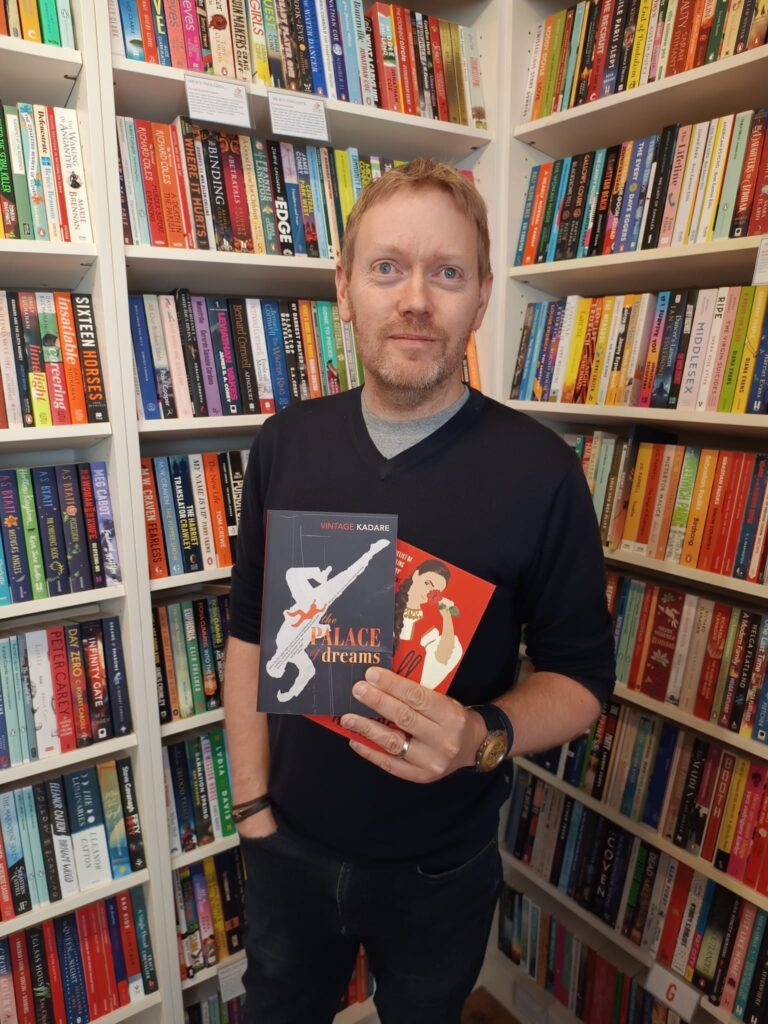
On 1st June 2008, we hosted the greatest modern Albanian writer Ismail Kadare for an event to celebrate the UK publication of The Siege. The interview took place in a blend of languages (English, French and Albanian) and he was interviewed by Julian Evans, and spoke alongside his translator David Bellos.
The event was one of the most significant in the early days of Mr B’s. We felt so honoured and trusted to be able to bring a legend of Balkan…European…World literature to the city.
Juliette and I both loved, still love, his writing from the magical realism of The Palace of Dreams, shining a petrifying light on the possibilities of the totalitarian state to the rich historical fiction of The Siege, a brilliant David and Goliath satire of an overly complex and bureaucratic C15 Ottoman army attempting to besiege an Albanian citadel. And then novels like Broken April shining a light on traditional, often brutal, rural Albanian life with its vendettas and blood-feuds, or Spring Flowers, Spring Frost looking at the rocky road travelled by a newly free state. If you are interested to get beneath the skin of Albania or just have a first insight into its culture and complex history, all reading roads start with Kadare.
My memories of that 2008 event though aren’t as clear as my memories of a moment from a dinner we were lucky enough to share with the author and the other event participants later that evening. We ate at a now long-lost independently owned (of course) Italian restaurant on Gay Street. We talked books and touring and all the usual conversation matter booksellers dredge up when involved in slightly in-awe exchanges off-stage with their author guests. Ismail had read from his Albanian copy of The Siege during the event so that our audience could hear a little fragment of his writing in the original language and now had that book on the table by his side.
I noticed that each time our waiter came over to top up our water or those lovely thin crispy breadsticks he hovered at Ismail’s shoulder and was looking confusedly down at the book. Eventually, after taking our orders, he cracked, explained that he himself was Albanian and wondered why one of our party had an Albanian copy of an Ismail Kadare novel on the table.
Ismail answered, in his mother tongue, that he had written it. The waiter’s reaction was only slightly more restrained than if my daughters were now to spot Taylor Swift at a neighbouring table. They broke into an animated conversation in Albanian – a visibly great relief for Ismail after all the tiring small talk in English that he was uncomfortable with – and soon books were gifted, signatures and selfies were taken and we received perhaps the best service, and most free limoncello shots, that any of us had ever experienced.
The waiter’s effusive fandom towards Ismail, it emerged, was not down just to his writing. It was down to his open criticism through his writing and beyond of the Albanian communist regime and his urging of the country towards democracy – first from within Albania and later from exile in France. To our waiter, Ismail Kadare was one of the most vital figures in the positive transformation of his home country, and to bump into him while going about his work at an Italian restaurant in Bath, was clearly mind-blowing.
In a prolific career Ismail Kadare wrote novels, plays, poetry, screenplays, essays and short story collections and his works have been translated into over 40 languages.
We were deeply saddened to hear that Ismail Kadare died on 1st July, 2024, aged 88. We are so thankful that we got to meet him and so grateful that his many books remain for us to carry on exploring and enjoying. – Nic.